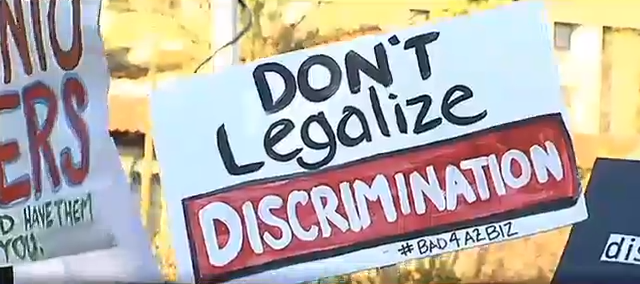
Responding to Arizona Gov. Jan Brewer's veto of a measure that would have sanctioned anti-gay business discrimination, The Washington Times' editorial board denounced the “lavender lobby” for asking for tolerance from “the people they despise most, men and women of faith.”
In an editorial published on March 5, the Times assailed Brewer's veto as a blow to religious freedom, relying (and not for the first time) on the extremist Alliance Defending Freedom (ADF) for comment. The Times' editors argued that the only way a business owner would know a customer's sexual orientation would be if “a customer walks in announcing his sexual proclivities.” The editorial also contemplated when a “wedding cake announces its sexual proclivities” (emphasis added):
The governor's veto “enables the foes of faith to more easily suppress the freedom of the people of Arizona,” argued Doug Napier, a lawyer with the Alliance Defending Freedom, based in Scottsdale, Ariz.
The proposed law was not Christian-specific, as it was often portrayed in the media, and would have, for two examples, protected the right of a Muslim caterer to refuse to arrange a pig roast, or a Jewish photographer (or any other photographer of good will) to decline a commission to photograph a neo-Nazi ceremony.
In saner and less litigious times than these, there never would have been a lawsuit. Bakeries, photographers and florists serve homosexual customers every day. The market is there to serve.
Unless a customer walks in announcing his sexual proclivities, a shopkeeper wouldn't know who's gay, merely cheerful or just having a bad hair day. He knows that he hurts only himself when he turns away a customer.
A wedding cake announces its sexual proclivities only when the baker puts two men or two women on it, and this, to many, mocks authentic marriage. Or maybe putting four hairy legs on a wedding cake just offends a baker's art.
[...]
The lavender lobby has a winning streak in the courts, but what homosexuals covet most is not the tolerance of the larger society, but the approval of society, and particularly the approval of the people they despise most, men and women of faith.
While the Times might not see any distinction between requiring a Jewish photographer to photograph a Neo-Nazi event and requiring businesses to treat gay customers equally, there's a substantial difference between identity and a political message. Anti-gay business owners refuse to serve people based on who they are. The only “message” conveyed by baking a gay couple a cake or photographing a commitment ceremony is that gay people exist and love each other.
The Times' endorsement of license to discriminate legislation further cements the paper's dubious distinction of having one of the most stridently homophobic editorial pages in the country. Previously, the editorial board has blasted "militant homosexual activists" for fighting against anti-LGBT discrimination, claimed that a San Antonio non-discrimination ordinance would ban Christians from public office, and asserted that a discriminatory bakery closed its storefront because it had been “hounded by gays.”